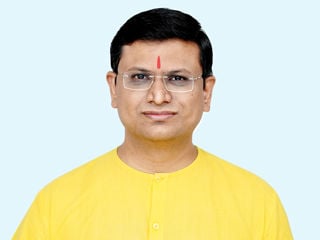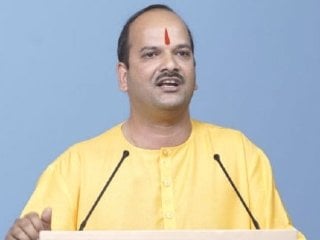Karnataka High Court has put restraint on school girls from wearing ‘hijab’ in school or appearing in exams; still however, agitations are going on at some places seeking permission for ‘hijab’. Few ‘hijabis’ have refused to write exams. Given below is an experience to find an answer to the issue that who really wants to make ‘hijab’ compulsory ?
1.Conversation with 3 girls wearing ‘Hijab’

It happened somewhere around 2017. I was travelling by train to Bhagyanagar (Hyderabad) from Goa in connection with a program. During this journey, 3 Muslim girls boarded the train at Hubballi (Karnataka) along with their ‘Abbajan’ (could have been their grandfather). There was a 4-seater arrangement across my seat, therefore, we got introduced and had conversation with each other.
The 3 girls were studying in 11th standard and were going for an examination held at Bhagyanagar (Hyderabad). He was travelling with them as a guardian and was a relative of one of the girls. The girls called him ‘Abbajan’. The 3 girls wearing black ‘hijab’ were quite talkative. One of them was wearing a full ‘burqa’, but her face was not covered. Out of curiosity, I asked them what was the difference between a ‘burqa’ and ‘hijab’. The father of one of the girls was a maulana in a mosque, so she explained, in detail, the references in Islam. I asked her how she knew so much in detail. She said that her father was a maulana, and he had told her about it.
2.Heated discussions on ‘Hijab’ and ‘Ghoonghat’ !

I said, “It is summer. In the month of May when it’s the peak of summer, don’t you feel very hot wearing the black scarf (hijab)?” The three of them replied that it was a decision of their religion; therefore, they were wearing ‘hijab’. One of them said further, “Even in your religion, women wear ‘ghoonghat’. Similarly, we wear ‘hijab’.” In short, our religions teach the same thing was what she was trying to emphasise.
I told them how the custom of wearing ‘ghoonghat’ was started in India when I explained, in detail, the persecution of Hindu girls by Sultani invaders and the custom was started out of fear. It was never in Hindu Dharma. I also explained in simple words how our goddesses don’t wear ‘ghoonghat’.
One of the girls got angry because I blamed Islam for the introduction of the custom of ‘ghoonghat’ and she said angrily that I was telling a fabricated story. This country first belonged to Muslims. Gandhi and Nehru sent our people to Pakistan. Their reply was enough for understanding how Muslims’ minds worked.
Who wants a ‘hijab’?
The other two girls and their ‘Abbajan’ were, however, listening with curiosity. I told them, “Many times, the information given to us may not be true, therefore, don’t think about it, but still, I feel, you are wearing the black scarf even in this hot weather because your ‘Abbajan’ is with you.” One of the girls blushed when their ‘Abbajan’ joined the conversation and said that he had not made it compulsory for anyone. It was their own decision. The third girl, however, frankly said that she was told by her father and till 9th standard, they didn’t wear ‘hijab’.
After some time, we reached Guntakal station where the train was to halt for 5 hours since the main train was to proceed to Bengaluru and our Bhagyanagar (Hyderabad) coaches were to be attached to another train. As the train stopped at Guntakal, ‘Abbajan’ got up and said to the 3 girls, “My old relatives stay here. I will come back in 3 hours; till then, take care.” After making sure that he had got off the train, the 3 girls got up from their seats and told me that they would go to market and come back in two hours before their ‘Abbajan’ returned.


Guntakal city is known for ornaments and cosmetics. After about 2 hours, the girls came back to the coach. They had purchased earrings, chains, black ‘bindis’, hair clips and small mirrors, etc. After coming back, they kept aside their ‘hijabi’ scarves and wore the ornaments they had just purchased, and looked in the mirror. I smiled and asked them whether the cosmetics and ornaments were cheap in Guntakal. All three of them said in unison that, indeed, they were very cheap. I then asked them whether it was allowed in Islam to adorn themselves. The 3 of them looked at each other and blushed. One of them dared to say no, it was not allowed, when the other girl said that I should not tell their ‘Abbajan’ that they had purchased such things. I said OK, but which gave me an answer to who really wanted ‘hijab’.
Adorning self is a natural act of a woman, but not to allow her to do it and ask her to be covered under the black scarf is an attitude against which there should have been a ‘stree-mukti (women’s liberation)’ movement, but who will explain it to the modern ‘stree-mukti’ activists?
– Mr. Chetan Rajhans, Spokesperson, Sanatan Sanstha.

 Goa : Felicitation Ceremony of H.H. Swami Govinddev Giri Maharaj
Goa : Felicitation Ceremony of H.H. Swami Govinddev Giri Maharaj Gujarat’s ‘Samanvay Parivar’ honours Sanatan Sanstha for its outstanding work of Dharmaprasar, conferred by Gujarat’s...
Gujarat’s ‘Samanvay Parivar’ honours Sanatan Sanstha for its outstanding work of Dharmaprasar, conferred by Gujarat’s... Samanvay Parivar organisation honours Sanatan Sanstha, award conferred by Gujarat Chief Minister Bhupendrabhai Patel
Samanvay Parivar organisation honours Sanatan Sanstha, award conferred by Gujarat Chief Minister Bhupendrabhai Patel Sanatan’s Gujarati eBook ‘Introduction to Spirituality’ launched in Vaishvik Hindu Rashtra Mahotsav
Sanatan’s Gujarati eBook ‘Introduction to Spirituality’ launched in Vaishvik Hindu Rashtra Mahotsav Bharat Gaurav Award conferred upon Sachchidananda Parabrahman Dr Jayant Athavale in French Senate
Bharat Gaurav Award conferred upon Sachchidananda Parabrahman Dr Jayant Athavale in French Senate The birthplace of Sachchidananda Parabrahman Dr Athavale – an ethereal experience
The birthplace of Sachchidananda Parabrahman Dr Athavale – an ethereal experience